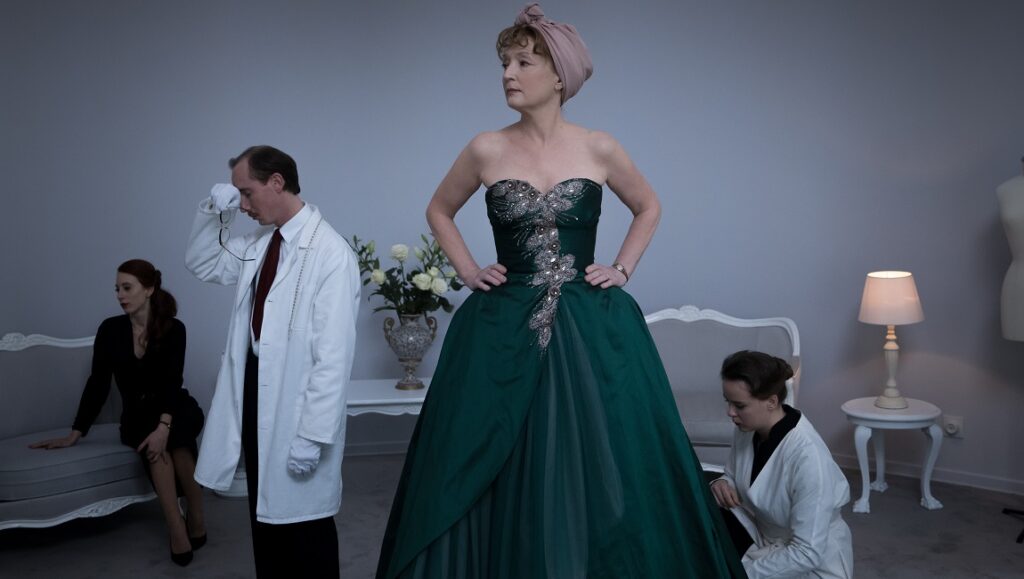Mrs. Harris Goes to Paris is appealingly quaint and visually pleasing, but dampens its delights with some soggy, unnecessary thematizing.
Director Anthony Fabian’s Mrs. Harris Goes to Paris marks the fourth adaptation of the beloved 1958 novel of the same name by Paul Gallico, but remarkably, this is the first to make it to the big screen. Perhaps the rather low-stakes plot has something to do with it: it tells the story of an English cleaning woman in 1957 London who, after saving up a rather tidy sum of cash, travels to Paris to buy a Christian Dior dress, spreading joy and sunshine wherever she goes. While lesser stories have been made into larger films — indeed, Thor: Love and Thudner is likely playing in the auditorium right next door to this one — it’s the very quaintness of Mrs. Harris that makes it so intoxicating, the type of entertainment that begs for a couch, a quilt, and a piping cup of cocoa.
But make no mistake, this latest iteration isn’t your mother’s Mrs. Harris. Indeed, the 2022 incarnation of the eponymous character is the type of woman who inspires strikes and walk-outs in a fed-up labor force tired of being manipulated by the cruel and demanding ruling class. “The time of treating people like scum and expecting loyalty is over!” Mrs. Harris exclaims at one point, with a spirit that casts Norma Rae and Betty Friedan as second-rate wannabes in the ever-waging war on class and gender inequality. Truly, it would be fair to retitle Fabian’s film Mrs. Harris Gets Woke in Paris, if to really target that Gen-Z demographic that will otherwise avoid this movie like the plague; their grandmothers, however, are sure to get a kick out of it.
Lesley Manville stars as our lovable heroine, Ada Harris, a cleaning lady with a heart of gold who lets her clients take advantage of her while dreaming of a better life. She avoids the harsh realities of life to such a degree that it’s only in the film’s opening moments that she finally summons the courage to open a 13-year-old package from the English war department that confirms her husband’s death in 1944 while fighting in WWII. While an argument could be made that this signals a troubled woman in a deep pit of a denial and despair, Ada quite pragmatically tells her best friend Vi (Ellen Thomas) that she knew he had to be dead because he didn’t come home. So apparently she’s fine; moving on. It’s while at the home of an especially heinous client that Ada first sets her eyes on a gorgeous Dior dress that so enraptures her that Fabian employs the Vertigo dolly zoom, just so you know how serious this is. Due to some rather contrived bits of good luck, Ada finally saves enough money to travel to Paris, for which she has budgeted exactly one day (more evidence of her clear derangement). In a rather serendipitous bit of fate, Ada arrives at Dior headquarters instead of any number of Parisian haute couture dress shops, inadvertently stumbling her way into a runway show as the personal guest of the handsome and obscenely wealthy Marquis de Chassagne (Lambert Wilson), who later takes her on a first date to a burlesque show that is roughly the equivalent of the porn theater scene in Taxi Driver. Meanwhile, Dior’s director, the snooty and frigid Louise Colbert (Isabelle Huppert), is appalled by this commoner, but is quickly put in her place when handsome accountant Andre (Lucas Bravo) reminds her that Dior is currently in no place to turn down a cash sale.
In this way, Mrs. Harris Goes to Paris presents as a study in contrasts, glomming on to the theme of appearances masking harsh truths lurking beneath the surface. Dior makes expensive dresses for the wealthy, but is cash poor; The City of Lights is prized for its beauty, but Ada’s trip coincides with a bin workers’ strike; Dior’s top model, Natasha (Alba Baptista), is ridiculously attractive and desirable, but prefers to spend her nights alone reading Sartre; Ada is a “nobody,” but inspires the best in everyone around her, proving that power and wealth are no match for human decency, or something. You get the picture. Given those broad messaging strokes, it’s hard to believe that it took a whopping four screenwriters to adapt this particular version, which is given a sheen of topicality without ever exhibiting any willingness to actually get its hands dirty.
The thing is, Mrs. Harris Goes to Paris is, by all accounts, the kind of film that frankly doesn’t need any depth, a sumptuous treat that’s as light as a souffle, a work of delicious empty calories when it sticks to reveling in its surface pleasures. Manville is thoroughly winning in a rare leading role, but the aforementioned thematic simplicity lowers the ceiling here, and no one who has seen her nuanced turns in the likes of Another Year and Phantom Thread will be getting too excited here. That goes doubly for Huppert, who is clearly relishing the opportunity to play a queen baddie, but it still doesn’t rise much above one-note archness. For Fabian’s part, his direction is workmanlike and unobtrusive, the film’s period milieu and narrative trappings lending it some visual finesse that similar works clogging the various Netflixes of the globe notably lack. Mrs. Harris Goes to Paris is ultimately a film that works best when it doesn’t try so hard to be about something; it plenty nice just to watch a sweet, middle-aged woman marvel at beautiful dresses in the fashion capital. We know how the sausage — or, more appropriately, the satin — is made. Keep your reality, no matter how sanitized, out of my wish fulfillment, thank you.


Comments are closed.